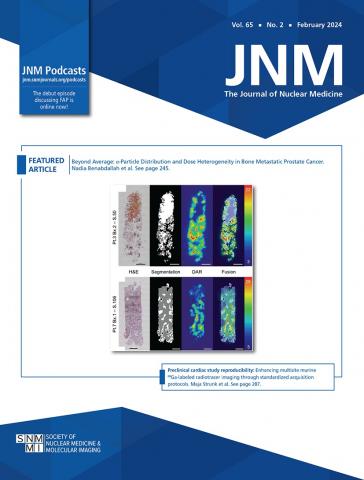Prediction of Response to 177Lu-PSMA Therapy Based on Tumor-to-Kidney Ratio on Pretherapeutic PSMA PET/CT and Posttherapeutic Tumor-Dose Evaluation in mCRPC.
IF 9.1
1区 医学
Q1 RADIOLOGY, NUCLEAR MEDICINE & MEDICAL IMAGING
Journal of Nuclear Medicine
Pub Date : 2023-11-01
Epub Date: 2023-08-31
DOI:10.2967/jnumed.122.264953
引用次数: 0
Abstract
Visual Abstract The aim of this study was to analyze the absorbed dose of 177Lu-PSMA in osseous versus lymphatic metastases in patients with metastatic castration-resistant prostate cancer across therapy cycles and to relate those data to therapeutic success. In addition, pretherapeutic prostate-specific membrane antigen (PSMA) PET/CT was evaluated for its ability to predict response behavior. Methods: The study comprised 30 patients with metastatic castration-resistant prostate cancer, each receiving at least 3 cycles of 177Lu-PSMA therapy. Prostate-specific antigen (PSA) values between baseline and 6 wk after the third therapy cycle were used to classify the patients as responders (PSA decline ≥ 50%) or nonresponders (unchanged or increasing PSA level). Quantitative SPECT/CT images were acquired 24, 48, and 168 h after application of 177Lu-PSMA. The absorbed dose for tumor lesions was calculated with dosimetry software. From the pretherapeutic PET/CT scan, the tumor-to-kidney uptake ratio was determined for different SUVs. Results: Regardless of patient response, the kidneys received a mean dose of 0.55 ± 0.20 Gy/GBq per cycle. In the first therapy cycle, the lymph node lesions received a mean dose of 3.73 ± 1.65 Gy/GBq in responders and 1.86 ± 1.25 Gy/GBq in nonresponders (P < 0.01). For bone lesions, the respective mean doses were 3.47 ± 2.00 Gy/GBq and 1.48 ± 0.95 Gy/GBq (P < 0.01). When successive therapy cycles were compared, the mean dose was found to have been reduced from the first to the second cycle by 27% for lymph nodes and by 33% for bone lesions. A significant difference (P < 0.01) in the ratio of lymph node and bone lesion uptake to kidney uptake between responders and nonresponders could be deduced from the pretherapeutic PET/CT scan. Conclusion: Significantly higher doses were achieved for lymph node and bone lesions in responders. The highest absorbed dose, for both lymphatic and osseous lesions, was achieved in the first cycle, decreasing in the second therapy cycle thereafter despite unchanged therapy activities. It may be possible to estimate the response to therapy from the ratio of tumor uptake to kidney uptake obtained from the pretherapeutic PSMA PET/CT scans.基于治疗前PSMA PET/CT中肿瘤与肾脏的比率预测177Lu PSMA治疗的疗效以及mCRPC中治疗后肿瘤剂量评估。
本研究的目的是分析177Lu-PSMA在转移性去势抵抗前列腺癌症患者的骨转移和淋巴转移中的吸收剂量,并将这些数据与治疗成功联系起来。此外,还评估了治疗前前列腺特异性膜抗原(PSMA)PET/CT预测反应行为的能力。方法:该研究包括30例转移性去势抵抗前列腺癌症患者,每个患者接受至少3个周期的177Lu-PSMA治疗。使用基线至第三个治疗周期后6周的前列腺特异性抗原(PSA)值将患者分为有反应(PSA下降≥50%)或无反应(PSA水平不变或增加)。分别采集24、48和168张SPECT/CT定量图像 h后应用177Lu PSMA。利用剂量测定软件计算肿瘤病变的吸收剂量。根据治疗前PET/CT扫描,确定不同SUV的肿瘤与肾脏摄取率。结果:无论患者反应如何,肾脏接受的平均剂量为0.55 ± 0.20 Gy/GBq每周期。在第一个治疗周期中,淋巴结病变的平均剂量为3.73 ± 1.65 响应者的Gy/GBq和1.86 ± 1.25 Gy/GBq(P<0.01)。对于骨病变,各自的平均剂量为3.47 ± 2 Gy/GBq和1.48 ± 0.95 Gy/GBq(P<0.01)。当比较连续的治疗周期时,发现从第一个周期到第二个周期,淋巴结的平均剂量减少了27%,骨病变的平均剂量降低了33%。从治疗前的PET/CT扫描可以推断出有反应者和无反应者的淋巴结和骨病变摄取与肾脏摄取的比率存在显著差异(P<0.01)。结论:对应答者的淋巴结和骨损伤,获得了显著更高的剂量。淋巴和骨病变的最高吸收剂量在第一个周期达到,在此后的第二个治疗周期降低,尽管治疗活动没有改变。可以根据从治疗前PSMA PET/CT扫描获得的肿瘤摄取与肾脏摄取的比率来估计对治疗的反应。
本文章由计算机程序翻译,如有差异,请以英文原文为准。
求助全文
约1分钟内获得全文
求助全文
来源期刊

Journal of Nuclear Medicine
医学-核医学
CiteScore
13.00
自引率
8.60%
发文量
340
审稿时长
1 months
期刊介绍:
The Journal of Nuclear Medicine (JNM), self-published by the Society of Nuclear Medicine and Molecular Imaging (SNMMI), provides readers worldwide with clinical and basic science investigations, continuing education articles, reviews, employment opportunities, and updates on practice and research. In the 2022 Journal Citation Reports (released in June 2023), JNM ranked sixth in impact among 203 medical journals worldwide in the radiology, nuclear medicine, and medical imaging category.
 求助内容:
求助内容: 应助结果提醒方式:
应助结果提醒方式:


